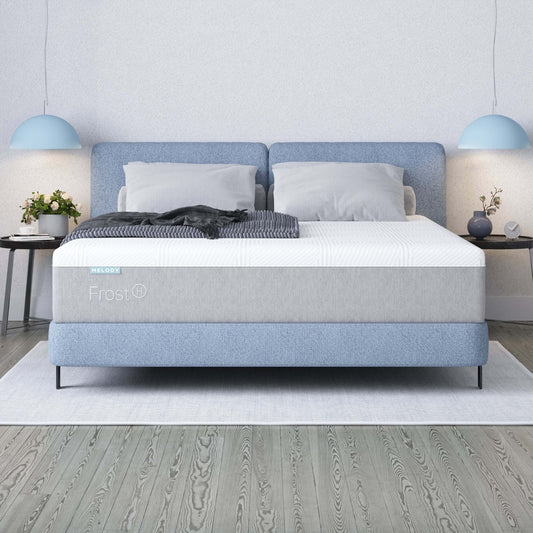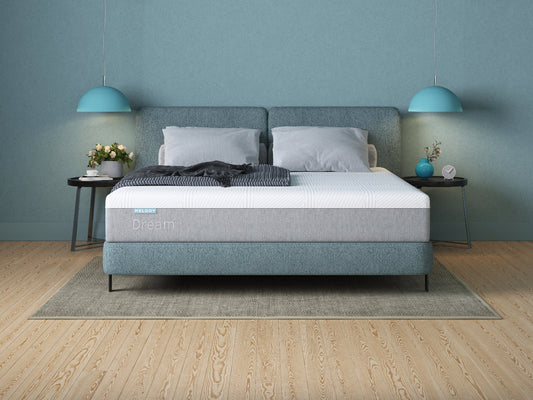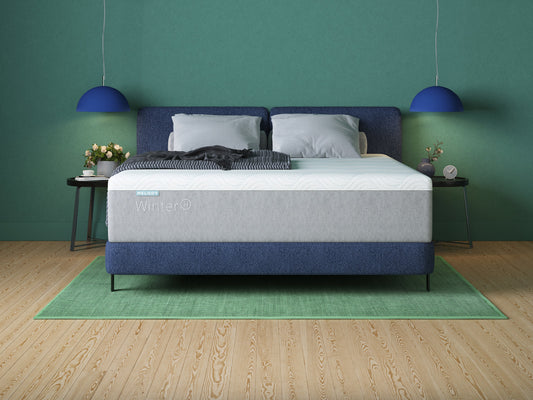Your mattress firmness affects not only how comfortable you feel when you lie down but also directly impacts the quality of your sleep, your spinal alignment, and your ability to wake up pain-free.
Choosing the wrong firmness can lead to chronic back pain, poor posture, increased tossing and turning, and even long-term health conditions like sciatica or arthritis.
On the other hand, the right firmness level helps support your body in all the right places, reducing pressure points and helping you experience deeper, uninterrupted sleep.
But here’s the catch: "firmness" is subjective. What feels firm to one person may feel too hard (or too soft) to another, depending on factors like weight, body shape, and sleep position.
That’s why understanding how to choose the mattress firmness that suits your needs is essential before your purchase.
Take a look at our guide and make a well-informed decision!
What Is the Mattress Firmness Scale?
When you're shopping for a mattress, you'll often see a firmness scale, typically ranging from 1 to 10.
This is a standardised way for manufacturers and retailers to communicate how soft or firm a mattress feels. While there can be slight variations between brands, the general principles remain consistent.

What to Consider When Choosing Mattress Firmness
Finding just the right mattress firmness requires taking a few important factors into consideration, such as:
Typical Sleeping Position
Side Sleepers
- Recommended Firmness: 3–4 (Soft), 5–6 (Medium)
- Why: Side sleepers put more pressure on their shoulders and hips. A softer mattress cushions these areas, helping prevent numbness and pain
- Ideal for: People with joint sensitivity or who prefer a contouring feel.
Back Sleepers
- Recommended Firmness: 5–6 (Medium), 6–7 (Medium-Firm)
- Why: Back sleepers need balanced support to maintain the spine’s natural curve. When a mattress is too soft, it causes sagging, and when it’s too firm, it pushes against the lower back.
- Ideal for: Sleepers needing both lumbar support and light cushioning.
Stomach Sleepers
- Recommended Firmness: 7–8 (Firm), 8–9 (Extra Firm)
- Why: Stomach sleeping can strain the neck and lower back if the mattress is too soft. A firmer surface prevents the midsection from sinking too deeply.
- Ideal for: People who need to keep their hips and spine aligned.
Combination Sleepers
- Recommended Firmness: 5–6 (Medium)
- Why: A medium mattress adapts well to different positions, offering enough give for side sleeping and enough support for back or stomach sleeping.
- Ideal for: Toss-and-turners or couples with different preferences.
Body Weight
Your weight plays a crucial role in choosing the right mattress firmness, as it influences how much pressure your body puts on the mattress surface and how deeply you sink into it.
Lightweight Sleepers (Under 60kg / <130 lbs)
- Recommended Firmness: Soft to Medium (3–5)
- Why: Lighter sleepers don’t compress the mattress as much, so firmer beds may feel too hard and uncomfortable. A softer mattress allows for better contouring and pressure relief, especially around the shoulders and hips.
- Best For: Side sleepers, petite individuals, or teenagers.
Average Weight Sleepers (60–100kg / 130–220 lbs)
- Recommended Firmness: Medium to Medium-Firm (5–7)
- Why: This range provides an excellent balance of support and comfort. Most medium mattresses can accommodate a wide variety of sleep positions and body types.
- Best For: Most adults and couples.
Heavyweight Sleepers (Over 100kg / >220 lbs)
- Recommended Firmness: Medium-Firm to Firm (7–9)
- Why: Heavier individuals tend to sink deeper into the mattress, which can lead to poor spinal alignment if the bed is too soft. A firmer mattress offers the necessary pushback to support the spine and avoid that “stuck” feeling.
- Best For: Back and stomach sleepers, plus heavier side sleepers who want support without sacrificing too much comfort.
Back Pain
Studies show that the most recommended range on the mattress firmness scale for back pain is 6 to 7 (medium-firm). Here’s why:
- Spinal Alignment: A medium-firm surface helps keep your spine in a neutral position, whether you sleep on your back or side.
- Even Weight Distribution: It prevents your hips from sinking too much, reducing stress on the lower back.
- Targeted Pressure Relief: While firm enough to support the spine, it still provides enough cushioning for pressure points like the shoulders, hips, and lower back.
📢 Find the Right Mattress for Your Needs

Real-Life Scenarios: What Mattress Firmness Works for Different People?
Selecting the right mattress is highly personal, and there’s no one-size-fits-all solution. Here are a few real-life scenarios to help illustrate who benefits most from various firmness levels:
Emma, 32 – Side Sleeper with Shoulder Pain (55kg)
- Problem: Emma wakes up with sore shoulders and feels like her mattress is pressing too hard on her joints.
- Need: A plush surface that cushions her shoulders and hips.
- Recommended Firmness: Soft to Medium (3–5)
- Why: A softer mattress helps alleviate pressure points without sacrificing support, so it’s perfect for lightweight side sleepers like Emma.
Ryan, 45 – Back Sleeper with Occasional Lower Back Pain (75kg)
- Problem: Daniel experiences mild lumbar discomfort, especially after long workdays at his desk.
- Need: Support for the lower back without feeling too hard.
- Recommended Firmness: Medium-Firm (6–7)
- Why: A medium-firm mattress provides the right balance of comfort and spinal alignment, helping prevent back pain from getting more intense.
Charlotte, 28 – Active Lifestyle, Combination Sleeper (65kg)
- Problem: Charlotte moves a lot in her sleep, and switches between her side, back, and stomach.
- Need: A mattress that adapts quickly and offers versatile support.
- Recommended Firmness: Medium (5–6)
- Why: A medium mattress is ideal for combination sleepers, as it’s soft enough for side sleeping, yet supportive enough for back and stomach positions.
Lee, 52 – Heavyweight Stomach Sleeper with Chronic Back Pain (105kg)
- Problem: Lee’s hips sink too much in soft beds, which makes his back hurt more.
- Need: A firm surface that keeps his spine aligned.
- Recommended Firmness: Firm (7–8)
- Why: A firm mattress prevents too much sinkage and supports proper posture, which is very important for stomach sleepers with heavier builds.
Hannah, 28 - Athlete with High Recovery Needs (66 kg)
- Problem: Hannah is a combination sleeper and passionate athlete who needs to recover effectively after her training.
- Need: A mattress that offers pressure relief for fatigued muscles and perfect spinal alignment and suits various sleeping positions.
- Recommended Firmness: Medium (Firmness 5-6).
- Why: Medium firmness offers the ideal balance of support for Hannah’s back and sufficient contouring for her side, which helps to alleviate pressure points and allows muscles to relax and recover effectively after intense physical activity.
Olivia & Aiden, 30s – Couple with Different Preferences
- Problem: Olivia is a side sleeper who prefers soft mattresses, while Aiden needs firmer support for his back.
- Need: A mattress that accommodates both.
- Recommended Solution: Medium-Firm (6–7)
- Why: A medium-firm mattress is often the best compromise for couples with differing needs. It offers enough contouring for Olivia’s pressure points as a side sleeper, without allowing her to sink too deeply. For Aiden, it provides sufficient support for his back without feeling overly hard.
👩❤️👨 Check Out Our King-Size Mattresses for Couples

Mattress Firmness Comparison Chart: What’s Best for You?
Use this quick-reference chart to compare the most popular firmness levels and find your perfect match based on your sleep position, body weight, and pain concerns.
📝 Mattress Firmness Buying Checklist
Before you buy a new mattress, ask yourself these questions:
-
What’s your primary sleep position?
• Side → Softer
• Back → Medium to Medium-Firm
• Stomach → Firm -
What’s your body weight range?
• <60kg → Soft to Medium
• 60–100kg → Medium to Medium-Firm
• >100kg → Medium-Firm to Firm -
Do you have back or joint pain?
• Yes → Medium-Firm is often the best -
Do you sleep with a partner?
• If yes, consider a middle-ground firmness -
Do you toss and turn at night?
• Go with Medium—it’s the most adaptable
🛏️ Shop Mattresses by Comfort Level at Melody Sleep

Conclusion
Choosing the right mattress firmness is very important for the quality of your sleep, spinal health, and relief from aches and pains. To know which level is right for you, take into account all the meaningful factors, such as your body weight, sleeping preferences, or any existing back problems.
Remember, what works for one person may not suit another, so use the comparison chart and checklist to make a better-informed decision, and benefit from Melody Sleep’s generous 200-night trial period to test your choice in the comfort of your own home.
👉 Looking for a perfect product for the Singaporean climate? Order our medium-firm or firm cooling mattresses now and start sleeping better!
FAQ
Does the type of mattress affect its firmness?
Yes, different types of mattresses offer varying levels of firmness. For example, innerspring mattresses tend to be firmer, memory foam mattresses offer a range of firmness levels and good contouring, while latex mattresses are naturally firmer but still provide some cushioning.
At Melody Sleep, you can find high-quality hybrid mattresses that combine various materials to give you the best of both worlds.
Is a firmer mattress better for hot climates like Singapore?
Firmer mattresses generally offer better airflow, which can be beneficial in a warm and humid climate like Singapore.
However, many modern mattresses (like Melody Sleep) use effective cooling technologies, so you can find softer options that still provide good temperature regulation.
How can I test mattress firmness before buying?
Visit our mattress showroom in Singapore where you can lie down on different mattresses to test the firmness. Spend at least 10-15 minutes in your usual sleeping position to get a good feel.
We also allow our customers to test our mattresses at home for as long as 200 nights with the right to get a refund or exchange the product for a different one.




